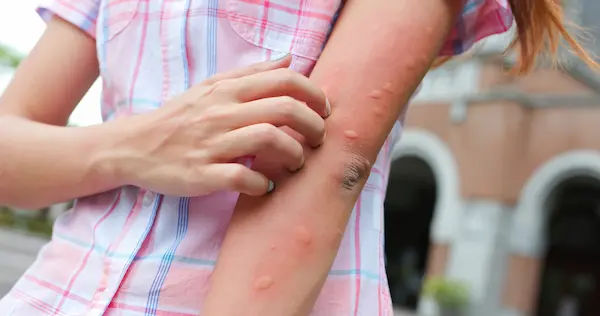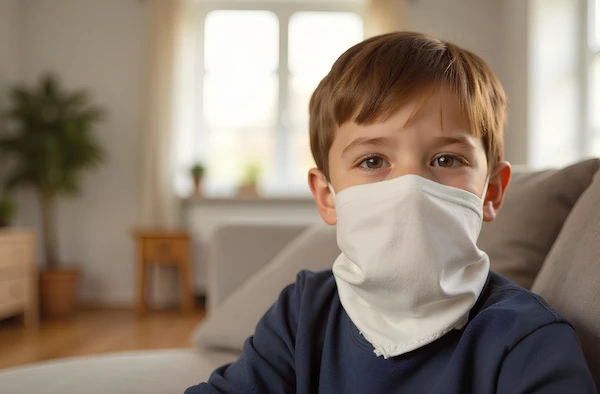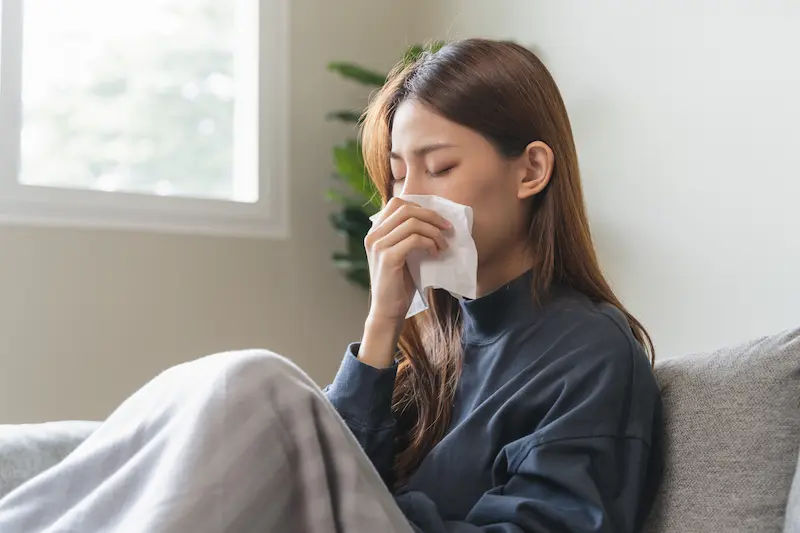Guide to Allergic Reactions To Insect Bites
Learn to recognise and manage insect bite allergies, from mild reactions to severe anaphylaxis, with effective first aid and treatment options.

Written by Dr. M L Ezhilarasan
Reviewed by Dr. Rohinipriyanka Pondugula MBBS
Last updated on 13th Jan, 2026

Introduction
That familiar itch of a mosquito bite is a summer nuisance for most. But for some, an insect bite or sting can trigger a frightening and potentially life-threatening allergic reaction. Your immune system, designed to protect you, can sometimes overreact to the venom or saliva injected by an insect, launching a disproportionate attack that causes symptoms far beyond a small, itchy bump. Understanding the difference between a normal response and a true allergic reaction is crucial for your health and safety. This guide will walk you through everything you need to know: from identifying the first signs of a serious allergic response to administering life-saving first aid and knowing precisely when to seek professional medical help from a service like Apollo24|7.
Normal Reaction vs. Allergic Reaction: Knowing the Difference
The first step in managing allergic reactions is recognising when a bite is more than just a minor irritation.
What a Typical Insect Bite Looks and Feels Like
A non-allergic reaction is usually localised to the site of the bite or sting. It involves:
- Instant, sharp pain or a burning sensation (especially from stings).
- A red, raised bump (a wheal) appearing within minutes.
- Mild to moderate itching and swelling that is confined to the immediate area.
- Symptoms that typically peak within 48 hours and subside completely within a week.
This is a standard inflammatory response as your body works to neutralise the foreign substance and heal the tissue.
The Tell-Tale Signs of an Allergic Response
An allergic reaction occurs when your immune system mistakenly identifies the insect venom or saliva as a major threat
and produces Immunoglobulin E (IgE) antibodies. This triggers the release of histamine and other chemicals into the
bloodstream, causing systemic symptoms. The key difference is that symptoms extend beyond the bite site.
Common Insects That Trigger Allergic Reactions
Not all insects are created equal when it comes to triggering allergies.
Stinging Insects: Bees, Wasps, and Hornets
These insects inject venom, which is a potent cocktail of proteins that most commonly causes severe allergic reactions.
Wasps and hornets can sting multiple times, while honeybees leave a barbed stinger behind. Reactions to these stings
are a leading cause of anaphylaxis from insect stings.
Biting Insects: Mosquitoes, Fleas, and Bedbugs
These insects inject saliva, which contains anticoagulants to keep your blood flowing while they feed. Allergies to mosquito saliva are common and can cause severe swelling from a mosquito bite, known as "skeeter syndrome."
Similarly, some people experience intense allergic reactions to flea bites or bedbug bites, characterised by clusters of
extremely itchy welts.
Spectrum of Allergic Responses: From Large Local to Anaphylaxis
Allergic reactions exist on a spectrum, from uncomfortable to critical.
Understanding Large Local Reactions (LLRs)
This is the most common type of allergic response. It involves significant swelling, redness, and pain that extends
beyond the sting site. For example, a sting on the forearm might cause the entire arm to swell. While dramatic and
uncomfortable, LLRs are not life-threatening and usually resolve within 3-10 days. However, they can be mistaken for
an infection.
Systemic Allergic Reactions: A Medical Emergency
A systemic reaction means the allergens have entered your bloodstream and are affecting your entire body. This is a
true medical emergency known as anaphylaxis. It can begin within minutes of the sting and requires immediate
treatment with epinephrine.
Symptoms of Anaphylaxis
- Skin: Widespread hives (urticaria), itching, and flushed or pale skin.
- Respiratory: Difficulty breathing, wheezing, swelling of the tongue and throat, tightness in the chest.
- Cardiovascular: A rapid, weak pulse, dizziness, fainting, a sharp drop in blood pressure (shock).
- Gastrointestinal: Nausea, vomiting, or diarrhoea.
- Neurological: A feeling of impending doom, confusion.
Immediate First Aid for Allergic Insect Bites
Your actions in the first few minutes are critical.
Step-by-Step Guide for Mild to Moderate Reactions
- Move to a safe area to avoid more stings.
- Remove the stinger if present (scrape it out sideways with a fingernail or credit card; avoid squeezing it).
- Wash the area with soap and water.
- Apply a cold compress or ice pack for 10 minutes to reduce swelling and pain.
- Apply an OTC remedy: Use hydrocortisone cream or calamine lotion for itching. Take an oral antihistamine like
diphenhydramine (Benadryl) for the allergic response.
First Response for Severe Anaphylaxis (Using an EpiPen)
- Use an epinephrine auto-injector (EpiPen®) immediately if prescribed. This is the first-line and only effective treatment
for anaphylaxis. - Call for emergency medical help (e.g., 999 in the UK or your local emergency number) immediately after using the
epinephrine. - Lie down with your feet elevated to maintain blood flow to the heart.
- Stay with the person until help arrives. A second reaction (biphasic anaphylaxis) can occur, so hospital monitoring is
essential.
Medical Treatments and Professional Care
For persistent or severe cases, professional medical intervention is necessary.
Consult a Specialist for the best advice
Over-the-Counter (OTC) Remedies
These are effective for mild reactions. Oral antihistamines combat itching and swelling, while pain relievers like
ibuprofen can alleviate pain. Topical anti-itch creams provide localised relief.
Prescription Medications
If OTC options aren't enough, a doctor may prescribe stronger corticosteroid creams or a course of oral steroids (e.g., prednisone) to control a large local reaction. If your condition does not improve after trying these methods, book a
physical visit to a doctor with Apollo24|7 for a stronger prescription and proper evaluation.
The Role of Allergy Testing and Immunotherapy
For individuals with a history of systemic reactions, an allergist can perform testing (skin prick or blood tests) to confirm
the specific insect venom allergy. The long-term solution is venom immunotherapy (VIT), a series of shots that
desensitise your immune system to the venom, reducing the risk of a severe future reaction to less than 5%.
How to Prevent Insect Bites and Subsequent Reactions
Prevention is always the best medicine.
- Use EPA-registered insect repellent containing DEET, picaridin, or oil of lemon eucalyptus.
- Wear protective clothing: long sleeves, long trousers, socks, and closed-toe shoes in high-risk areas.
- Avoid perfumes and brightly coloured clothing, which can attract stinging insects.
- Be cautious with food and drinks outdoors, keeping them covered.
- Inspect and seal your home to prevent nesting and entry.
- For those with known severe allergies, always carry an epinephrine auto-injector and ensure you and those around you
know how to use it.
Conclusion
While most insect bites are merely a temporary annoyance, understanding the potential for allergic reactions is vital for
your well-being. By learning to distinguish between a normal bump and the signs of a severe response like anaphylaxis, you empower yourself to take the right action at the right time. Remember, quick first aid and knowing when to seek
help—whether through a quick online consultation for a persistent rash or emergency services for a life-threatening reaction—can make all the difference. Don't let the fear of bites ruin your outdoor adventures. Stay informed, be prepared, and enjoy the outdoors safely. If you're unsure about your symptoms or they are worsening, consult a doctor online with Apollo24|7 for further evaluation and peace of mind.
Consult a Specialist for the best advice
Consult a Specialist for the best advice

Dr. Mainak Baksi
General Practitioner
13 Years • MBBS , MD (MPH)
Howrah
Mainak Baksi Clinic, Howrah
(50+ Patients)

Dr Suseela
General Physician
5 Years • MBBS
Bengaluru
Apollo Medical Center, Marathahalli, Bengaluru

Dr. Rajib Ghose
General Physician/ Internal Medicine Specialist
25 Years • MBBS
East Midnapore
VIVEKANANDA SEBA SADAN, East Midnapore

Dr. Suvadeep Sen
Critical Care Specialist
12 Years • MBBS, MD, FNB (CRITICAL CARE MEDICINE), EDIC
Mumbai
Apollo Hospitals CBD Belapur, Mumbai

Dr. Shiv Krishna Mitra
General Practitioner
15 Years • MBBS GEN. MED. PGDRM, MCH
Kolkata
Samaritan Clinic, Kolkata
Consult a Specialist for the best advice

Dr. Mainak Baksi
General Practitioner
13 Years • MBBS , MD (MPH)
Howrah
Mainak Baksi Clinic, Howrah
(50+ Patients)

Dr Suseela
General Physician
5 Years • MBBS
Bengaluru
Apollo Medical Center, Marathahalli, Bengaluru

Dr. Rajib Ghose
General Physician/ Internal Medicine Specialist
25 Years • MBBS
East Midnapore
VIVEKANANDA SEBA SADAN, East Midnapore

Dr. Suvadeep Sen
Critical Care Specialist
12 Years • MBBS, MD, FNB (CRITICAL CARE MEDICINE), EDIC
Mumbai
Apollo Hospitals CBD Belapur, Mumbai

Dr. Shiv Krishna Mitra
General Practitioner
15 Years • MBBS GEN. MED. PGDRM, MCH
Kolkata
Samaritan Clinic, Kolkata
More articles from Allergies
Frequently Asked Questions
1. How long after an insect bite can an allergic reaction occur?
Severe anaphylactic reactions typically occur within 5-30 minutes of the sting. Large local reactions may develop and peak over 24-48 hours. Delayed reactions (e.g., serum sickness) are rare but can occur days later.
2. Can you develop an allergy to insect bites later in life?
Yes, it is entirely possible. You can have normal reactions to stings your whole life and then suddenly have an allergic reaction as an adult. The immune system's response can change over time.
3. What does an infected insect bite look like vs. an allergic one?
An allergic reaction typically causes widespread swelling and redness soon after the bite. An infection (cellulitis) develops later (24-72 hours after) and features increasing pain, warmth, redness, pus, and sometimes fever. Allergic itching is common; infectious pain is more prominent.
4. When should you go to the hospital for a bug bite?
Go immediately if you experience signs of anaphylaxis (trouble breathing, throat tightness, dizziness, widespread hives). Also go if you have signs of a severe infection (red streaks spreading from the bite, fever, extreme pain).
5. Are there any effective home remedies for allergic bug bites?
For mild reactions, a paste of baking soda and water, a cool oatmeal bath, or aloe vera gel can provide soothing relief from itching. However, these do not treat the underlying allergic response and are no substitute for antihistamines or medical care for more serious reactions.



